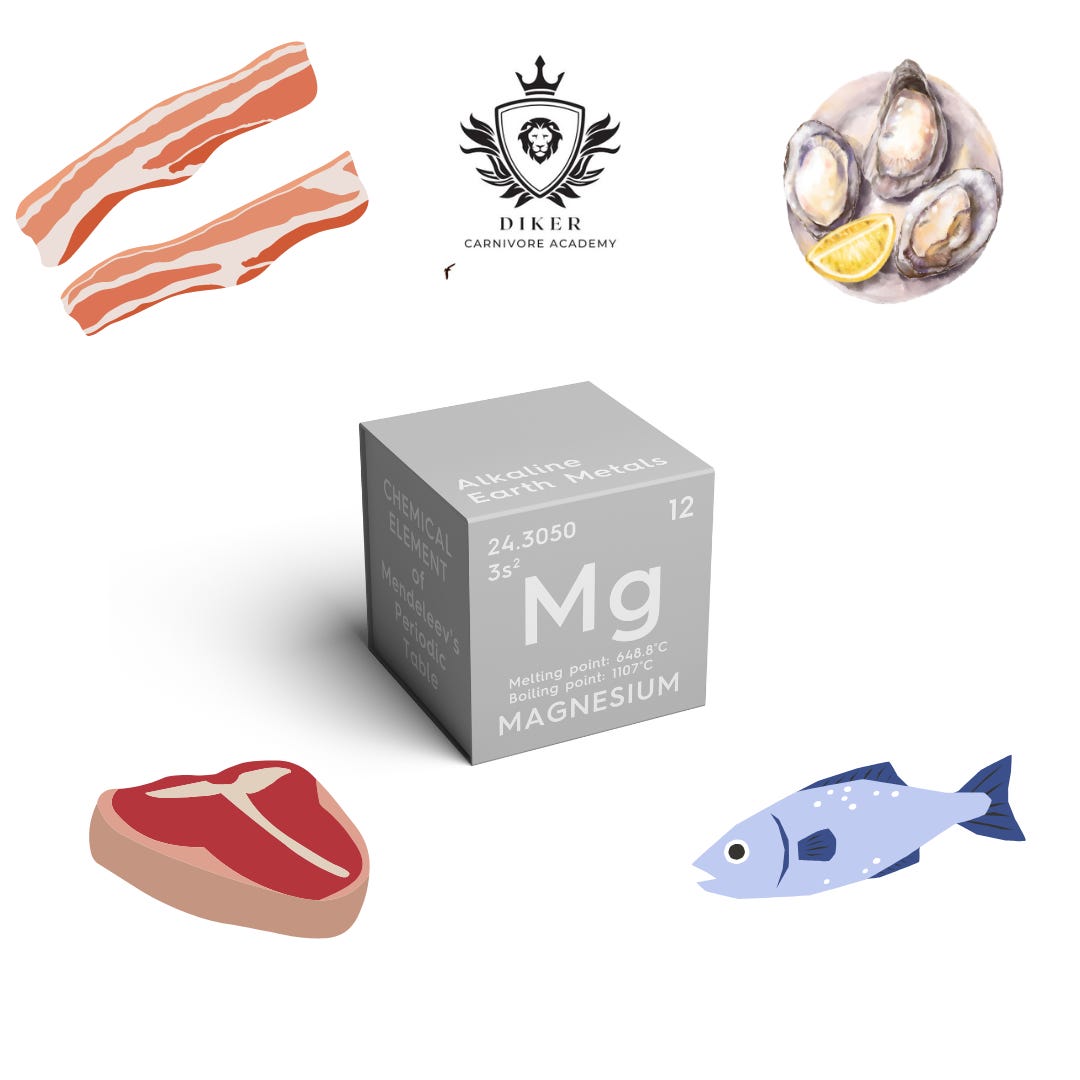Unleash the Power of Magnesium on Your Carnivore Diet | Benefits and Tips
Discover the benefits of incorporating magnesium into your carnivore diet. Learn how it aids in energy production, muscle function, and recovery. #keto #carnivorediet #carnivore #ketogenic
Magnesium in the carnivore diet is an essential nutrient that plays a key role in nearly every bodily function.
Magnesium is involved in over 600 cellular reactions in the body, making it a vital nutrient for overall health and well-being. It is required for proper muscle and nerve function, energy production, DNA synthesis, and protein synthesis.
Additionally, magnesium plays a crucial role in regulating blood pressure, maintaining a steady heartbeat, and supporting a healthy immune system. This essential mineral is also known for its ability to support bone health by aiding in the absorption of calcium.
Introduction to the Carnivore Diet
The carnivore diet has gained popularity in recent years as a way to improve health and achieve weight loss. This diet primarily consists of animal products such as meat, fish, and eggs, while eliminating carbohydrates and plant-based foods. While the carnivore diet can provide many essential nutrients, it is important to pay attention to potential deficiencies that may arise, including magnesium.
Magnesium is an essential mineral that plays a crucial role in various bodily functions. In this article, we will delve into the importance of magnesium for those following a carnivore diet and explore the benefits it can offer.
The Benefits of Magnesium for the Carnivore Diet
Incorporating magnesium into your carnivore diet can provide numerous benefits. Firstly, magnesium helps to maintain normal muscle function and can aid in preventing muscle cramps and spasms, which are common during intense workouts. It can also support a healthy sleep routine by promoting relaxation and reducing anxiety.
Magnesium has been shown to have a positive impact on mood and can help alleviate symptoms of depression and anxiety. Additionally, this essential mineral plays a crucial role in promoting cardiovascular health by regulating blood pressure and reducing the risk of heart disease.
Why Do You Need Magnesium?
Magnesium is an electrolyte that supports numerous bodily functions. It acts as a spark plug, igniting over 600 cellular reactions that are essential for optimal health. Without sufficient magnesium, these crucial processes may be compromised, leading to various health issues. Therefore, it is crucial to ensure an adequate intake of magnesium to support overall well-being.
Building and maintaining muscle tissue
Normal nerve function
Maintaining glucose levels
The creation of DNA and RNA–our genetic machinery that runs our bodies
The ability to synthesize protein
The maintenance of heart rhythm
Synthesizes compounds into ATP–the fundamental energy molecule in your body.
Signs of Magnesium Deficiency and How to Address Them on a Carnivore Diet
If you suspect a magnesium deficiency while following a carnivore diet, there are several steps you can take to address it. Firstly, consider incorporating magnesium-rich foods into your meals, as mentioned earlier.
Symptoms of magnesium deficiency include:
Muscle cramps
Heart palpitations
High blood pressure
Fatigue
Migraines
Heart attacks
Low Vitamin D
Tips for Incorporating More Magnesium into Your Carnivore Diet
Ribeye steak provides 22 mg of magnesium per 100-gram (3.5 oz) serving.
When it comes to steak on the carnivore diet, it’s more helpful to measure nutrients per pound. 1lb of ribeye steak has around 100mg of magnesium. And 1 lb of lamb provides about the same.
Therefore, including steak in your carnivore diet can help meet your magnesium needs while enjoying a delicious and nutritious meal.
Magnesium in Fish
Fish, especially sardines, mackerel, anchovies, and chinook salmon, are a fantastic way to achieve your magnesium intake.
A 100-gram serving of chinook salmon provides 122 mg of magnesium. If you were to consume 1 pound of chinook (king) salmon, you’d be well over your RDA at 549 mg or around 137% of your RDA.
Magnesium in Cheese
Cheese can be a valuable source of magnesium for those following the carnivore diet. Opt for high-quality, full-fat cheese options to ensure maximum nutrient content, including magnesium. Including cheese in your carnivore diet can add variety and nutritional benefits to your meals.
Parmesan cheese: 38 mg per 100 grams
How Carbs and Plant Antinutrients Affect Magnesium Levels
One challenge for individuals following the carnivore diet is the absence of plant-based foods, which are typically a significant source of magnesium. While the carnivore diet can provide adequate magnesium through animal products, it is essential to be aware of how carbohydrates and plant antinutrients can affect magnesium levels.
Carbohydrates can increase the excretion of magnesium in urine, potentially leading to magnesium deficiency. However, the carnivore diet, with its low carbohydrate intake, minimizes this risk.
Plant antinutrients, such as phytates and oxalates found in certain plant foods, can bind to magnesium and inhibit its absorption. By eliminating these plant foods from the carnivore diet, you can optimize magnesium absorption and utilization from animal sources.
Magnesium in Organs
Organ meats from ruminant animals provide similar amounts of magnesium as muscle meats.
For instance, beef liver provides between 14-25 mg of magnesium per 100-gram serving. Thats amazing. While beef pancreas provides 20.3 mg per 100-gram serving.
Conclusion and Final Thoughts on the Power of Magnesium for Carnivores
In conclusion, magnesium plays a crucial role in optimizing the benefits of the carnivore diet. By ensuring adequate magnesium intake, you can support muscle function, promote mental well-being, and mitigate the risk of magnesium deficiency symptoms. Incorporate magnesium-rich foods into your carnivore diet, consider supplementation Elevate your carnivore diet with the power of magnesium, and enjoy the numerous health benefits it offers.
CTA: Why do You Need Magnesium? Magnesium is an electrolyte. This means that it has a small electrical charge which allows it to act like a spark plug igniting over 600 cellular reactions that support vital bodily processes. To optimize your health and well-being on the carnivore diet, make sure to prioritize magnesium-rich foods, consider supplementation if necessary, and consult with a healthcare professional for personalized advice. Magnesium in steak, organs, bone broth, pork, and fish can enhance your carnivore diet and help you achieve optimal health.










